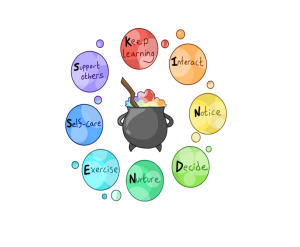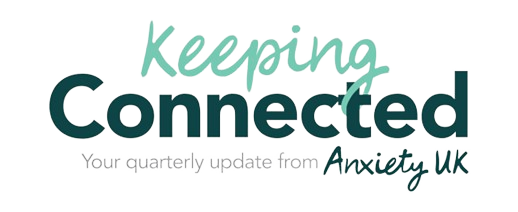Guest blog – The role of shame in anxiety disorders ….
…. and how learning to be kinder to ourselves and have compassion for our struggles can help.
by Dr Elaine Beaumont
When we feel anxious, we experience several different symptoms. For example, we may notice physical symptoms such as our heart racing, sweaty palms and/or dizziness. We may also notice thoughts or images. For example:
“Other people cope…why can’t I”.
“I’m pathetic”.
“I can’t tell people how I feel, they will think I’m stupid or weak”.
“I can’t believe I can’t do this. I’m so ashamed of myself”.
We may find ourselves avoiding situations or engaging in behaviours that we think will help us cope. We may also experience unpleasant emotions, such as fear, guilt, or shame, which can lead to rumination and an increase in self-criticism. With shame we may avert our gaze – bow our head in shame.
Emotions such as shame can be very debilitating, which makes it less likely that we can do something about bringing change to our difficulties. Professor Paul Gilbert the founder of Compassion Focused Therapy (CFT) suggests that cultivating compassion for our struggles may be the antidote to shame and self-criticism. CFT was originally developed to help people with high levels of shame and self-criticism.
We may experience shame because we have had a panic attack in a public place, felt socially anxious and therefore cancelled plans with a friend, or lied about being poorly because we wanted to avoid doing a presentation at work. Shame makes us worry excessively about what other people will think and triggers a threat system response alerting our mind and body to potential danger.
In The Compassionate Mind Workbook, Dr Chris Irons and I discuss how experiencing shame (a threat emotion) narrows our thinking, which in turn leads to self-critical thoughts such as “I can’t do anything right – I’m a pathetic failure”. We fall into thinking traps often jumping to conclusions about what other people think or experience black and white thinking (seeing things as either all good or all bad). Identifying the thinking traps we get caught up in can help us learn to be kinder and more compassionate to ourselves.
Experiencing shame may mean that we are afraid to reach out for help. Our compassionate mind knows that we all experience struggles at times and that life can be difficult. Our compassionate mind is wise and courageous and knows that reaching out for help can help us to engage with the situation that we find anxiety provoking. As human beings it’s important to remember that we all experience anxiety. The wise and compassionate mind wants to help us feel safe enough to engage in difficult conversations and to face things in life that are difficult.
Compassion as an antidote to shame
Shame can block our connection to other people, which is why learning to be kind to ourselves and having compassion for our struggles can be powerful. If you don’t feel ready to reach out for support here are a few ideas that you may find helpful.
- Notice how you speak to yourself and consider if you would speak to somebody you care about in the same way. You may find that you would be kinder to somebody else. You live with yourself 365 days a year, 24 hours a day, can you learn to respond to yourself in a way that means you are your own best friend instead of worse enemy!
- Think about what would be helpful and not harmful in the situation. Notice the content of your thoughts. Are they critical thoughts? What would you say to a friend that was feeling this way.
- Create a Pre, During and After Plan (PDA).
A PDA Plan (not public, display of affection plan!) involves preparing yourself pre the event to manage the anxious situation. For example, could listening to music that you associate with strength and courage help? Could you imagine everything going the way you want it to and then visualise potential obstacles? Could relaxation techniques and slowing down your breathing help? You could practice a mantra or say slowly and calmly ‘mind slowing down, body slowing down’. During the anxiety provoking situation could you imagine a compassionate other, cheerleader or superhero? Someone maybe from your past or a religious figure that has your best interest at heart. With this ‘other’ by your side can you connect with a strength and courage. Can you be mindful of your facial expression, an open body posture and your inner voice? The voice tone and the language we use can make a difference. During the anxiety provoking situation include kind statements and thoughts, rather than self-critical judgemental statements. After the anxiety provoking situation think about what went well and if you can look in the mirror and say well done to yourself.
Compassionate mind interventions can help people develop compassion for themselves, be open to the compassion of others and develop compassion for others. There is increasing evidence that suggests that cultivating compassion for oneself and others can have a profound impact on our physiological, psychological, and social processes. In contrast, concerns with inferiority, shame and self-criticism can have very negative impacts on these processes and are associated with poorer physical and mental health. Cultivating a compassionate mind may help people with the ‘internal bully’ we all have within us at times.
If you can respond to anxiety and shame with compassion rather than self-criticism you are likely to:
- Start to feel more confident and worry less.
- Do the things you have always wanted to do.
- Be more assertive and stick up for what you believe in.
- Challenge yourself.
- Learn from your mistakes (rather than avoid making them).
- Experience less anxiety, low mood and/or frustration.
For The Kindness Workbook, Dr Mary Welford and I created the K.I.N.D.N.E.S.S mnemonic. The memory aid is a prompt to help people focus on the key (kindness) ingredients that help build and maintain physical and mental health. This may be important because when our mental health takes a nosedive this can have a detrimental effect on our physical health.
The “kindness ingredients” are:
Keep Learning: What would you like to learn to do?
Interact: How could you interact and communicate more?
Notice: It’s important to notice and acknowledge how you feel. Do you notice when your mood takes a nosedive and when it gets a boost?
Decide: Making decisions that have your wellbeing at heart can help you live a fulfilling life (instead of a life that’s driven by fear or avoidance). What decisions can you make that are good for your wellbeing?
Nurture: Being kind to yourself. If you’re having a bad day, think about what will help you feel better. How do you look after yourself and how might you build on that? Does it help to have a ‘time out’ on your own when things are difficult, or does it help if you’re around animals or nature?
Exercise: Being active increases the release of your feel-good hormones, but also can help you connect with other people. What physical activities do you like to do and what activities might you want to try?
Self-care: Looking after your physical and mental health can give your wellbeing a boost. What could you improve? What helps you relax or have fun? What can you do to pamper or treat yourself?
Support Others: We all experience multiple emotions. Research suggests that a kind word or gesture can brighten up somebody else’s day and make us feel good too.

© Elaine Beaumont, Mary Welford & Phoebe Munday (2020)
If you would like to learn more about Compassion Focused Therapy you can reach out to the team at AUK, download The Self-Compassion App, which you can try for free Compassionate Mind App | Chris Irons & Elaine Beaumont | England (selfcompassion.me). You can find The Kindness Workbook (Creative and Compassionate Ways to Boost Wellbeing) and The Compassionate Mind Workbook on the AUK website. https://www.anxietyuk.org.uk/?s=the+kindness+workbook https://www.anxietyuk.org.uk/?s=the+compassionate+mind+workbook
Dr Elaine Beaumont is a Cognitive Behavioural Psychotherapist and Europe-approved Eye Movement Desensitisation and Reprocessing Practitioner. She is a lecturer at the University of Salford, where her research explores the impact Compassionate Mind Training and Compassion Focused Therapy has in educational and clinical settings. Elaine provides a variety of workshops regarding mental health, compassion and wellbeing for organisations, and her research has been presented worldwide.







